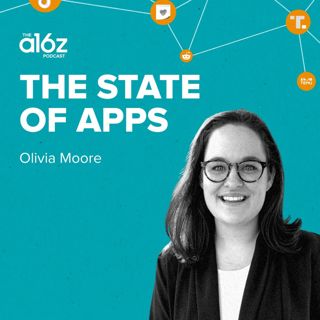
The State of Apps
A few weeks ago, Apple released a stunning statistic: they’ve paid developers over $320B — yes, billion! — since the launch of the App Store in 2008, highlighting the cast opportunity in the marketplace.And around the same time, a16z Consumer Partner, Olivia Moore, compiled a list of the top apps across the US app store throughout 2022.In this episode, you’ll get to hear which apps made it to the top and what they have in common. Hint: the big winners were in social, but perhaps a new wave of social apps!We also get the scoop on what it really takes to not just hit #1, but stay there. This episode highlights numerous surprising examples ranging from a new-age Beanie Baby app, a viral talking dog, an app from 2012 that finally broke the top 10, and the Chinese app that’s been at #1 for a majority of 2023, and it’s not TIkTok!There are endless learnings about how new founders can take advantage of these opportunities.Timestamps:01:51 - Top apps in 202203:32 - A new era of social?07:22 - Hitting #109:30 - Staying on top11:20 - Building a sticky product13:46 - Growing an app in 202315:35 - User-generated growth17:48 - 2022 category winners20:39 - Anonymous social22:24 - Early monetization26:30 - Monetization trends31:07 - Leveraging platform shifts35:26 - Surprising hits37:50 - Looking toward 202339:38 - Invisible AI products41:46 - Limiting virality45:13 - Vertical social networks48:37 - When digital goes physical51:44 - TikTok growth53:27 - Geographic trends56:18 - A decade old app1:00:25 - App challengeResources: Follow Olivia on Twitter: https://twitter.com/omooretweetsOlivia's 2022 analysis: https://twitter.com/omooretweets/status/1605983056682045440Olivia's 2021 analysis: https://twitter.com/omooretweets/status/1483482099562602500Justine’s Boating app commentary: https://twitter.com/venturetwins/status/1616121691830390784Olivia’s Tinder subscription commentary: https://twitter.com/omooretweets/status/1616480480546942976Apps mentioned: BeReal: https://apps.apple.com/us/app/bereal-your-friends-for-real/id1459645446TikTok: https://apps.apple.com/us/app/tiktok/id835599320Gas App: https://apps.apple.com/us/app/gas/id1641791746Talking Ben the Dog: https://apps.apple.com/us/app/talking-ben-the-dog/id416345319Argo Boating Navigation: https://apps.apple.com/us/app/argo-boating-navigation/id1463869636NoteIt: https://apps.apple.com/us/app/noteit-widget-get-it-now/id1570369625Locket Widget: https://apps.apple.com/us/app/locket-widget/id1600525061LiveIn: https://apps.apple.com/us/app/livein-share-your-moment/id1606780589Slay: https://apps.apple.com/de/app/slay-komplimente-umfragen/id1645858841Lensa AI: https://apps.apple.com/us/app/lensa-photo-editing/id1436732536Starlink: https://apps.apple.com/us/app/starlink/id1537177988NOAA Weather: https://apps.apple.com/us/app/noaa-weather/id436760574Stardust Period Tracker: https://apps.apple.com/us/app/stardust-period-tracker/id1495829322Temu: https://apps.apple.com/us/app/temu-team-up-price-down/id1641486558SquadApp: https://apps.apple.com/us/app/squadapp-collection-database/id1623120952TravelBoast: https://apps.apple.com/us/app/travelboast-my-journey-routes/id1476504378Subway Surfers: https://apps.apple.com/us/app/subway-surfers/id512939461Stay Updated: Find us on Twitter: https://twitter.com/a16zFind us on LinkedIn: https://www.linkedin.com/company/a16zSubscribe on your favorite podcast app: https://a16z.simplecast.com/Follow our host: https://twitter.com/stephsmithioPlease note that the content here is for informational purposes only; should NOT be taken as legal, business, tax, or investment advice or be used to evaluate any investment or security; and is not directed at any investors or potential investors in any a16z fund. For more details please see a16z.com/disclosures. Stay Updated:Find a16z on XFind a16z on LinkedInListen to the a16z Podcast on SpotifyListen to the a16z Podcast on Apple PodcastsFollow our host: https://twitter.com/eriktorenberg Please note that the content here is for informational purposes only; should NOT be taken as legal, business, tax, or investment advice or be used to evaluate any investment or security; and is not directed at any investors or potential investors in any a16z fund. a16z and its affiliates may maintain investments in the companies discussed. For more details please see a16z.com/disclosures. Hosted by Simplecast, an AdsWizz company. See pcm.adswizz.com for information about our collection and use of personal data for advertising.
9 Feb 20231h 4min
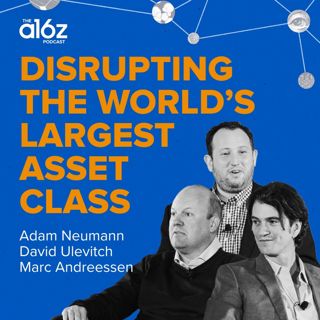
Disrupting the World’s Largest Asset Class with Adam Neumann
Back in August, after a16z announced our investment into Adam Neumann’s new company, Flow, it felt like almost everyone – whether it was other VCs, founders, or journalists – had something to say.But the one person that you didn’t hear from was Adam himself.In this never-before shared footage from a16z’s American Dynamism Summit in Washington DC, Adam Neumann sits down with Marc Andreessen and David Ulevitch, to discuss the opportunities that have emerged from post-pandemic shifts in both work and home, and what Flow is doing to capitalize.Find the full library of American Dynamism Summit recordings at a16z.com/ad-summit.Timestamps:00:00 - Introduction01:40 - Getting back in the arena 09:03 - The opportunity in housing 16:19 - Lessons from WeWork 19:13 - Work & home post-pandemic 27:34 - Moving to the cloud 34:23 - Office serendipity 37:51 - Building Flow 43:51 - Cities as startupsResources:Flow’s website: https://www.flow.life/American Dynamism recordings: https://a16z.com/ad-summit Stay Updated: Find us on Twitter: https://twitter.com/a16zFind us on LinkedIn: https://www.linkedin.com/company/a16zSubscribe on your favorite podcast app: https://a16z.simplecast.com/Follow our host: https://twitter.com/stephsmithioPlease note that the content here is for informational purposes only; should NOT be taken as legal, business, tax, or investment advice or be used to evaluate any investment or security; and is not directed at any investors or potential investors in any a16z fund. For more details please see a16z.com/disclosures. Stay Updated:Find a16z on XFind a16z on LinkedInListen to the a16z Podcast on SpotifyListen to the a16z Podcast on Apple PodcastsFollow our host: https://twitter.com/eriktorenberg Please note that the content here is for informational purposes only; should NOT be taken as legal, business, tax, or investment advice or be used to evaluate any investment or security; and is not directed at any investors or potential investors in any a16z fund. a16z and its affiliates may maintain investments in the companies discussed. For more details please see a16z.com/disclosures. Hosted by Simplecast, an AdsWizz company. See pcm.adswizz.com for information about our collection and use of personal data for advertising.
7 Feb 202349min

Healthspan, Lifespan, and the Biology of Aging
In this cross-over episode from Bio Eats World, Kristen Fortney, cofounder and CEO of BioAge, joins Vijay Pande, founding partner of a16z Bio + Health, and Olivia Webb, editorial lead, to discuss the biology of aging, how she started a company, and some fun things — like how long a hypothetical venture capitalist can expect to live. Resources:Greg Egan, whose writing inspired Kristen, has a list of his books on his website Stay Updated: Find us on Twitter: https://twitter.com/a16zFind us on LinkedIn: https://www.linkedin.com/company/a16zSubscribe on your favorite podcast app: https://a16z.simplecast.com/Follow our host: https://twitter.com/stephsmithioPlease note that the content here is for informational purposes only; should NOT be taken as legal, business, tax, or investment advice or be used to evaluate any investment or security; and is not directed at any investors or potential investors in any a16z fund. For more details please see a16z.com/disclosures. Stay Updated:Find a16z on XFind a16z on LinkedInListen to the a16z Podcast on SpotifyListen to the a16z Podcast on Apple PodcastsFollow our host: https://twitter.com/eriktorenberg Please note that the content here is for informational purposes only; should NOT be taken as legal, business, tax, or investment advice or be used to evaluate any investment or security; and is not directed at any investors or potential investors in any a16z fund. a16z and its affiliates may maintain investments in the companies discussed. For more details please see a16z.com/disclosures. Hosted by Simplecast, an AdsWizz company. See pcm.adswizz.com for information about our collection and use of personal data for advertising.
3 Feb 202336min
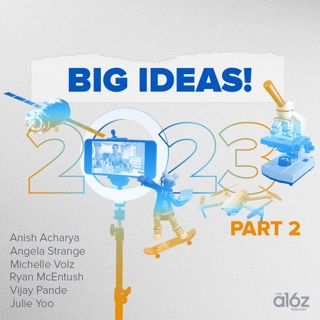
2023 Big Ideas in Technology (Part 2)
At the end of 2022, our team at a16z asked dozens of partners across the firm to spotlight one big idea that startups in their fields could tackle in 2023.Emerging from this exercise came 40+ builder-worthy pursuits for the year, ranging from entertainment franchise games to precision delivery of medicine to small modular reactors, and of course loads of AI applications.In our 2-part series, we’ll be covering 12 of these big ideas with the partners that shared them.Here in part 2, we’ll cover Fintech, American Dynamism, and Bio & Health. Listen in as we chat with Anish Acharya, Angela Strange, Michelle Volz, Ryan McEntush, Vijay Pande, and Julie Yoo.And for the full list of 40+ ideas, check out the full article: https://a16z.com/2022/12/15/big-ideas-in-tech-2023/Topics Covered:(0:59) GPT Unlocks Credit Counseling - Anish Acharya(9:53) Compliance as a Competitive Advantage - Angela Strange(23:31) Small Modular Reactors Advance the Nuclear Renaissance - Michelle Volz(33:48) Overhauling the Space Supply Chain - Ryan McEntush(44:40) The Biggest Company in the World - Vijay Pande(51:17) The Value-Based Care Stack - Julie YooResources:https://a16z.com/2022/11/02/america-space-age/https://a16z.com/2022/11/11/the-biggest-company-in-the-world/https://a16z.com/2021/01/08/the-new-tech-stack-for-virtual-first-care/ Stay Updated: Find us on Twitter: https://twitter.com/a16zFind us on LinkedIn: https://www.linkedin.com/company/a16zSubscribe on your favorite podcast app: https://a16z.simplecast.com/Follow our host: https://twitter.com/stephsmithioPlease note that the content here is for informational purposes only; should NOT be taken as legal, business, tax, or investment advice or be used to evaluate any investment or security; and is not directed at any investors or potential investors in any a16z fund. For more details please see a16z.com/disclosures. Stay Updated:Find a16z on XFind a16z on LinkedInListen to the a16z Podcast on SpotifyListen to the a16z Podcast on Apple PodcastsFollow our host: https://twitter.com/eriktorenberg Please note that the content here is for informational purposes only; should NOT be taken as legal, business, tax, or investment advice or be used to evaluate any investment or security; and is not directed at any investors or potential investors in any a16z fund. a16z and its affiliates may maintain investments in the companies discussed. For more details please see a16z.com/disclosures. Hosted by Simplecast, an AdsWizz company. See pcm.adswizz.com for information about our collection and use of personal data for advertising.
27 Jan 20231h 8min
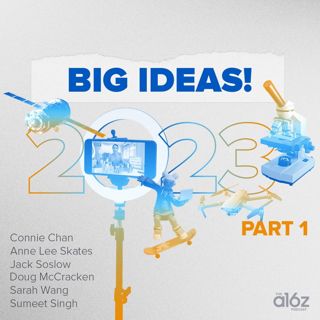
2023 Big Ideas in Technology (Part 1)
At the end of 2022, our team at a16z asked dozens of partners across the firm to spotlight one big idea that startups in their fields could tackle in 2023.Emerging from this exercise came 40+ builder-worthy pursuits for the year, ranging from entertainment franchise games to precision delivery of medicine to small modular reactors, and of course loads of AI applications.In our 2-part series, we’ll be covering 12 of these big ideas with the partners that shared them.Here in part 1, we’ll cover Consumer, Games, and Enterprise, with a little Fintech sprinkled in. Listen in as we chat with Connie Chan, Anne Lee Skates, Jack Soslow, Doug McCracken, Sarah Wang, and Sumeet Singh.And look out for part 2 dropping soon, covering Fintech, American Dynamism, and Bio & Health!For the full list of 40+ ideas, check out the full article: https://a16z.com/2022/12/15/big-ideas-in-tech-2023/Topics Covered:(1:30) Breakthroughs in Buying (Finally!) - Connie Chan(16:40) Unlocking the “Third Place” - Anne Lee Skates(30:14) Games as a Neverending Turing Test - Jack Soslow(46:09) The Metaverse Goes Fashion Forward - Doug McCracken(59:24) Generative AI Advances Beyond “Text to Image” to Complex Workflows - Sarah Wang(1:12:23) Embracing Large Language Models and Maintaining Trust - Sumeet SinghStay Updated: Find us on Twitter: https://twitter.com/a16zFind us on LinkedIn: https://www.linkedin.com/company/a16zSubscribe on your favorite podcast app: https://a16z.simplecast.com/Follow our host: https://twitter.com/stephsmithioPlease note that the content here is for informational purposes only; should NOT be taken as legal, business, tax, or investment advice or be used to evaluate any investment or security; and is not directed at any investors or potential investors in any a16z fund. For more details please see a16z.com/disclosures. Stay Updated:Find a16z on XFind a16z on LinkedInListen to the a16z Podcast on SpotifyListen to the a16z Podcast on Apple PodcastsFollow our host: https://twitter.com/eriktorenberg Please note that the content here is for informational purposes only; should NOT be taken as legal, business, tax, or investment advice or be used to evaluate any investment or security; and is not directed at any investors or potential investors in any a16z fund. a16z and its affiliates may maintain investments in the companies discussed. For more details please see a16z.com/disclosures. Hosted by Simplecast, an AdsWizz company. See pcm.adswizz.com for information about our collection and use of personal data for advertising.
24 Jan 20231h 22min
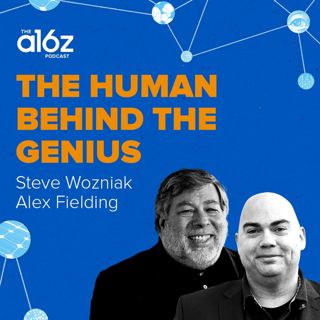
The Human Behind the Genius
In this special episode, we share never heard before footage from Steve Wozniak alongside his cofounder and best man, Alex Fielding. Listeners get an inside look into what drove Woz to building a computer, but also how Steve’s zest for life was applied beyond computers – from the rare opportunity to play Tetris on the side of a building or throw a concert across borders. Full Privateer episode: https://a16z.simplecast.com/episodes/new-the-data-highway-above-with-privateers-steve-wozniak-alex-fielding-and-dr-moriba-jahFull Privateer episode on Youtube: https://youtu.be/ZZbrwxOs0y4 Stay Updated: Find us on Twitter: https://twitter.com/a16zFind us on LinkedIn: https://www.linkedin.com/company/a16zSubscribe on your favorite podcast app: https://a16z.simplecast.com/Follow our host: https://twitter.com/stephsmithioPlease note that the content here is for informational purposes only; should NOT be taken as legal, business, tax, or investment advice or be used to evaluate any investment or security; and is not directed at any investors or potential investors in any a16z fund. For more details please see a16z.com/disclosures. Stay Updated:Find a16z on XFind a16z on LinkedInListen to the a16z Podcast on SpotifyListen to the a16z Podcast on Apple PodcastsFollow our host: https://twitter.com/eriktorenberg Please note that the content here is for informational purposes only; should NOT be taken as legal, business, tax, or investment advice or be used to evaluate any investment or security; and is not directed at any investors or potential investors in any a16z fund. a16z and its affiliates may maintain investments in the companies discussed. For more details please see a16z.com/disclosures. Hosted by Simplecast, an AdsWizz company. See pcm.adswizz.com for information about our collection and use of personal data for advertising.
19 Jan 202322min
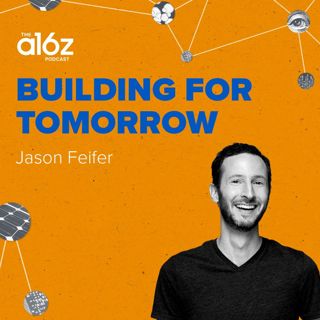
Building for Tomorrow
New year, new you! Right?Well, as much as we’d all like to believe that we embrace the new… the reality is that we often resist change.That’s why we’ve brought in someone who has studied how humans respond to and adapt to change – or sometimes how we fail to. That person is Jason Feifer – long-time editor in chief at Entrepreneur Magazine, host of two popular podcasts, and recent author of his book Build for Tomorrow. Today, Jason shares 6 specific frameworks around the very natural human responses to change, which he’s developed through interviewing and studying some of the most influential people in the world – past and present. We also play a fun game at the end, where Jason comments on current technologies encountering pushback, and assesses where they might fit into his framework. Jason’s website: https://www.jasonfeifer.com/Jason on Twitter: https://twitter.com/heyfeiferJason’s book Build for Tomorrow: https://www.jasonfeifer.com/book/ Stay Updated: Find us on Twitter: https://twitter.com/a16zFind us on LinkedIn: https://www.linkedin.com/company/a16zSubscribe on your favorite podcast app: https://a16z.simplecast.com/Follow our host: https://twitter.com/stephsmithioPlease note that the content here is for informational purposes only; should NOT be taken as legal, business, tax, or investment advice or be used to evaluate any investment or security; and is not directed at any investors or potential investors in any a16z fund. For more details please see a16z.com/disclosures. Stay Updated:Find a16z on XFind a16z on LinkedInListen to the a16z Podcast on SpotifyListen to the a16z Podcast on Apple PodcastsFollow our host: https://twitter.com/eriktorenberg Please note that the content here is for informational purposes only; should NOT be taken as legal, business, tax, or investment advice or be used to evaluate any investment or security; and is not directed at any investors or potential investors in any a16z fund. a16z and its affiliates may maintain investments in the companies discussed. For more details please see a16z.com/disclosures. Hosted by Simplecast, an AdsWizz company. See pcm.adswizz.com for information about our collection and use of personal data for advertising.
12 Jan 20231h 14min
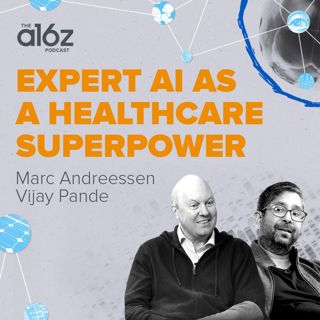
Expert AI as a Healthcare Superpower
In this episode, Marc Andreessen and Vijay Pande discuss expert AI and its role in healthcare, bio, and more. Watch on Youtube: https://youtu.be/c7ScUDYSRYoSubscribe to Bio Eats World: https://podcasts.apple.com/us/podcast/bio-eats-world/id1529318900 Stay Updated: Find us on Twitter: https://twitter.com/a16zFind us on LinkedIn: https://www.linkedin.com/company/a16zSubscribe on your favorite podcast app: https://a16z.simplecast.com/Follow our host: https://twitter.com/stephsmithioPlease note that the content here is for informational purposes only; should NOT be taken as legal, business, tax, or investment advice or be used to evaluate any investment or security; and is not directed at any investors or potential investors in any a16z fund. For more details please see a16z.com/disclosures. Stay Updated:Find a16z on XFind a16z on LinkedInListen to the a16z Podcast on SpotifyListen to the a16z Podcast on Apple PodcastsFollow our host: https://twitter.com/eriktorenberg Please note that the content here is for informational purposes only; should NOT be taken as legal, business, tax, or investment advice or be used to evaluate any investment or security; and is not directed at any investors or potential investors in any a16z fund. a16z and its affiliates may maintain investments in the companies discussed. For more details please see a16z.com/disclosures. Hosted by Simplecast, an AdsWizz company. See pcm.adswizz.com for information about our collection and use of personal data for advertising.
10 Jan 202357min





















